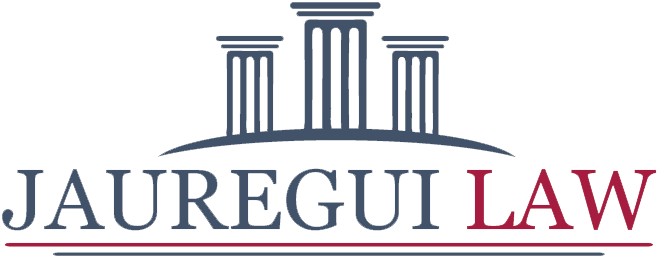
CRIMINAL DEFENSE
PROCESS OF CRIMINAL CASES
INVESTIGATION
Law enforcement agencies conduct an investigation to collect and provide evidence to the prosecution. If you have been contacted by any law enforcement office, such as the police, FBI, DEA, ATF, etc, do not answer any questions without the representation of an attorney. You have the right to remain silent and the right to an attorney for a reason. Jauregui Law can protect your rights at this critical time. Call us now for a free consultation.
ARREST / CHARGING
For some criminal charges, you may be arrested on the spot. You still have the right to remain silent and the right to an attorney to represent you. Other charges come by arrest warrant, grand jury, or indictment. Once arrested or charged, you may have to post a bond. Jauregui Law may be able to lower this bond at a bond hearing. If you or your loved one has been arrested, call us now for a free consultation.
ARRAIGNMENT
Arraignment is usually the first preliminary court hearing. At this hearing, the prosecution will announce the charges against you. In addition, the judge will ask whether you will plead guilty or not guilty. Jauregui Law, P.A. will plead you not guilty, request the evidence against you, and demand a trial. The earlier we represent you in a criminal matter, the more we can do to protect and fight for you.
DISCOVERY & NEGOTIATIONS
The prosecution must provide a witness list, copies of documents or evidence they intend to introduce at trial. This process is called discovery, and continues from the time the case begins to the time of trial. Both sides may depose the witnesses. While depositions are not an obligation, they help lock in a witness’s testimony and uncover important facts. During the discovery process, both sides analyze their case, its strengths and weaknesses, and conduct negotiations.
MOTIONS
Motions are the manner in which we ask the court to order someone to do something. For example, we can request a bond, demand additional evidence from the prosecution, have the Court suppress other evidence, have witnesses excluded, and charges dismissed. Motion hearings take place throughout the different stages of the criminal process. Some motions are time sensitive.
SOUNDING / PRE-TRIAL CONFERENCE
Sounding is a report date where both sides meet with the judge to discuss the progress of your case. Topics discussed include plea bargain possibilities, strengths and weaknesses of the prosecution’s case, progress of the preparation of the case for both sides, pretrial motions and other factors of the case. It is at this hearing where the trial date will be set.
TRIAL
At trial, the prosecution will present the witnesses and evidence to a judge or jury. The trial begins with the opening statements. The prosecution presents his case to support the charges and then rests. The defense presents his case to refute the charges and then rests. Closing arguments by both the prosecution and defense conclude the trial. The judge or jury then deliberates and find whether you are Guilty or Not Guilty.
SENTENCING
If you are found guilty at trial, the judge must determine the appropriate sentencing. The judge determines the length and type of punishment at a sentencing hearing.
APPEAL
If found guilty by way of trial, we may request a higher court to change the lower court’s decision based on any legal errors. The appellate process is primarily limited to correcting flaws in procedure and not to change a trial Court’s finding of fact. It is important to recognize that the appeals process may only begin after the defendant has received the final verdict. However, time limits do exist. They are very short – often less than 30 days and mostly as short as 10 days. Don’t lose your right to appeal! At the very least, a notice of appeal must be filed as soon as possible.
